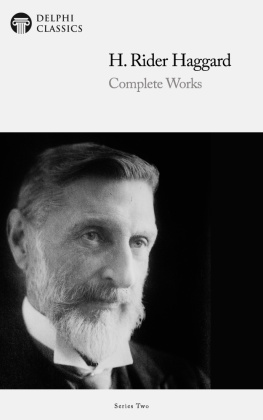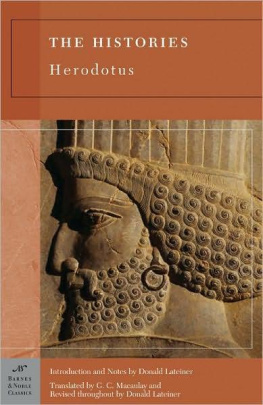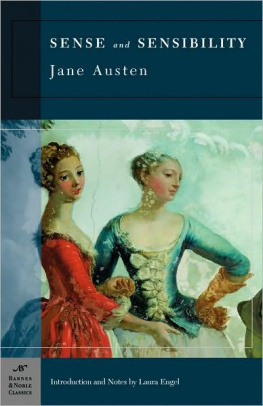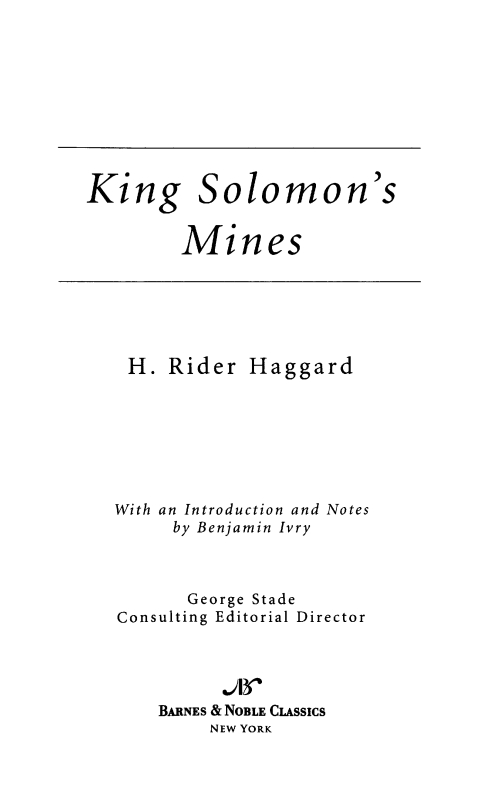
Table of Contents
From the Pages of
King Solomons Mines
A sharp spear, runs the Kukuana saying, needs no polish; and on the same principle I venture to hope that a true story, however strange it may be, does not require to be decked out in fine words.
(page 8)
There, there, it is a cruel and a wicked world, and for a timid man I have been mixed up in a deal of slaughter. (page 10)
I am a fatalist, and believe that my time is appointed to come quite independently of my own movements, and that if I am to go to Sulimans Mountains to be killed, I shall go there and shall be killed there. God Almighty, no doubt, knows His mind about me, so I need not trouble on that point. (page 30)
There is no journey upon this earth that a man may not make if he sets his heart to it. (page 49)
If we cannot find water we shall all be dead before the moon rises to-morrow. (page 58)
There he sat, a sad memento of the fate that so often overtakes those who would penetrate into the unknown; and there probably he will still sit, crowned with the dread majesty of death, for centuries yet unborn, to startle the eyes of wanderers like ourselves, if any such should ever come again to invade his loneliness. (page 70)
The diamonds are surely there, and you shall have them since you white men are so fond of toys and money. (page 92)
The sun is dyingthe wizards have killed the sun. (page 124)
I shook my head and looked again at the sleeping men, and to my tired and yet excited imagination it seemed as though death had already touched them. My minds eye singled out those who were sealed to slaughter, and there rushed in upon my heart a great sense of the mystery of human life, and an overwhelming sorrow at its futility and sadness. To-night these thousands slept their healthy sleep, to-morrow they, and many others with them, ourselves perhaps among them, would be stiffening in the cold; their wives would be widows, their children fatherless, and their place know them no more for ever. (page 131)
Suddenly, with a bound and a roar, they sprang forward with uplifted spears, and the two regiments met in deadly strife. Next second, the roll of the meeting shields came to our ears like the sound of thunder, and the whole plain seemed to be alive with flashes of light reflected from the stabbing spears. To and fro swung the heaving mass of struggling, stabbing humanity. (page 146)
We are the richest men in the whole world, I said. Monte Christo is a fool to us. (page 183)
There around us lay treasures enough to pay off a moderate national debt, or to build a fleet of ironclads, and yet we would gladly have bartered them all for the faintest chance of escape. (page 188)
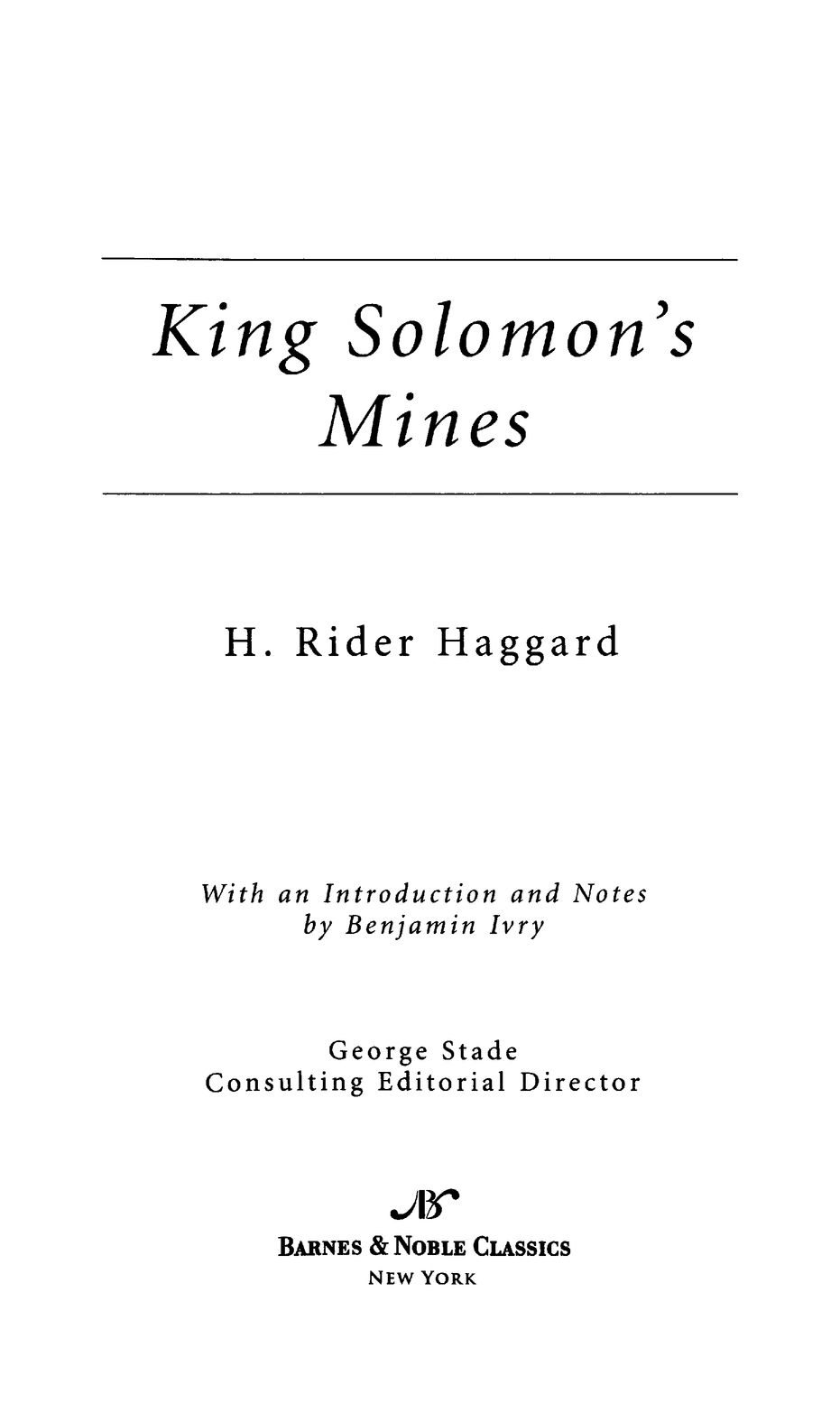
H. Rider Haggard
H. Rider Haggard wrote King Solomons Mines, the story goes, after his brother bet him he couldnt pen a book as exotic, thrilling, and commercially successful as Robert Louis Stevensons 1883 adventure novel Treasure Island. Haggard succeeded, and went on to write dozens more best-selling tales. Though his family initially had low expectations for him, Haggard not only made a living as an author; he also learned Zulu, brokered peace treaties, took part in the annexing of territories, and acted as the British Empires right-hand man in the diamond- and gold-rich colonies of South Africa.
Born on June 22, 1856, in Norfolk, England, Henry Rider Haggard was the eighth of ten children. His father was a country squire and barrister; his mother was an Englishwoman raised in India. Haggard exhibited little academic ambition during his youth and did not attend university. After he failed the army entrance exam, he was sent to London to prepare for a post in the Foreign Office. In 1875 family connections secured him a job as secretary to Governor Henry Bulwer in Britains Natal colony in South Africa. For the next four years, Haggard served the British Empire in various capacities, storing in his mind settings and events he would later use in his novels. He witnessed tense rebellions and outright war, served as a diplomat and aide, and hunted big game for sportthe stuff of his countrymens wildest imaginings. However modern society may interpret the ideas expressed in King Solomons Mines, Haggards tale is an imaginatively embellished reflection of direct experience, one that gives us a window into the British colonial mind.
In 1879 Haggard returned briefly to England, where he met an heiress from Norfolk, Louisa Margitson; they married the next year. The couple returned to Africa, but their stay was brief; in 1881 they returned to England, where Haggard read for the bar and began to write fiction. King Solomons Mines, published in 1885, was Haggards third novel and his first popular success. He followed up the best-seller with a string of other novels, including a wildly popular tale of a 2,000-year-old queen, She: A History of Adventure (1887). Personal suffering muted Haggards success when his nine-year-old son died in 1891. A daughter, Lilias, was born the next year; she would eventually publish a biography of her father.
Although he maintained a farm and country house in Norfolk, Haggard traveled to Egypt, Mexico, Canada, the United States, and South Africa. He lectured and published reports on agriculture, one of his fields of expertise. His work was often in the service of the British government, which honored him with a knighthood in 1912 and made him a Knight Commander of the British Empire in 1919.
Haggard authored more than fifty works of fiction and nonfiction in his lifetime. His psychologically complex novels about distant lands influenced writers from Sigmund Freud and Carl Jung to Joseph Conrad, C. S. Lewis, and Henry Miller. H. Rider Haggard died on May 14, 1925, in London.
The World of H. Rider Haggard
and King Solomons Mines
| 1856 | Henry Rider Haggard is born the eighth of ten children on June 22 in Norfolk, England. His father, William, is a country squire and barrister; his mother, Ella Doveton, is an amateur writer who was raised in India. Great Britain establishes a crown colony in Natal, South Africa. |
| 1857 | The Boers (South Africans of Dutch or Huguenot descent) establish the South African Republic in the region known as the Transvaal. |
| 1859 | Charles Darwin publishes On the Origin of Species by Means of Natural Selection. |
| 1865 | Lewis Carrolls Alices Adventures in Wonderland appears. |
| 1867 | A diamond field is discovered in South Africa. Alfred Nobel invents dynamite. |
| 1873 | Haggard fails the army entrance exams; his family sends him to London to be trained to join the Foreign Office. |
| 1875 | While in London, Haggard experiments with spiritualism. His father arranges for him to go to South Africa, where he works as a secretary to the governor of Britains colony in Natal, Sir Henry Bulwer. |
| 1877 | Haggard joins the staff of special commissioner Sir Theophilus Shepstone and hoists the flag at the British annexation of the Transvaal. |
| 1878 | Haggards service earns him the position of master and registrar of the High Court in the Transvaal. |
| 1879 | On January 22 Zulu King Cetshwayos army wipes out a British regiment that includes many of Haggards friends. In May Haggard resigns his post and returns to England. |


